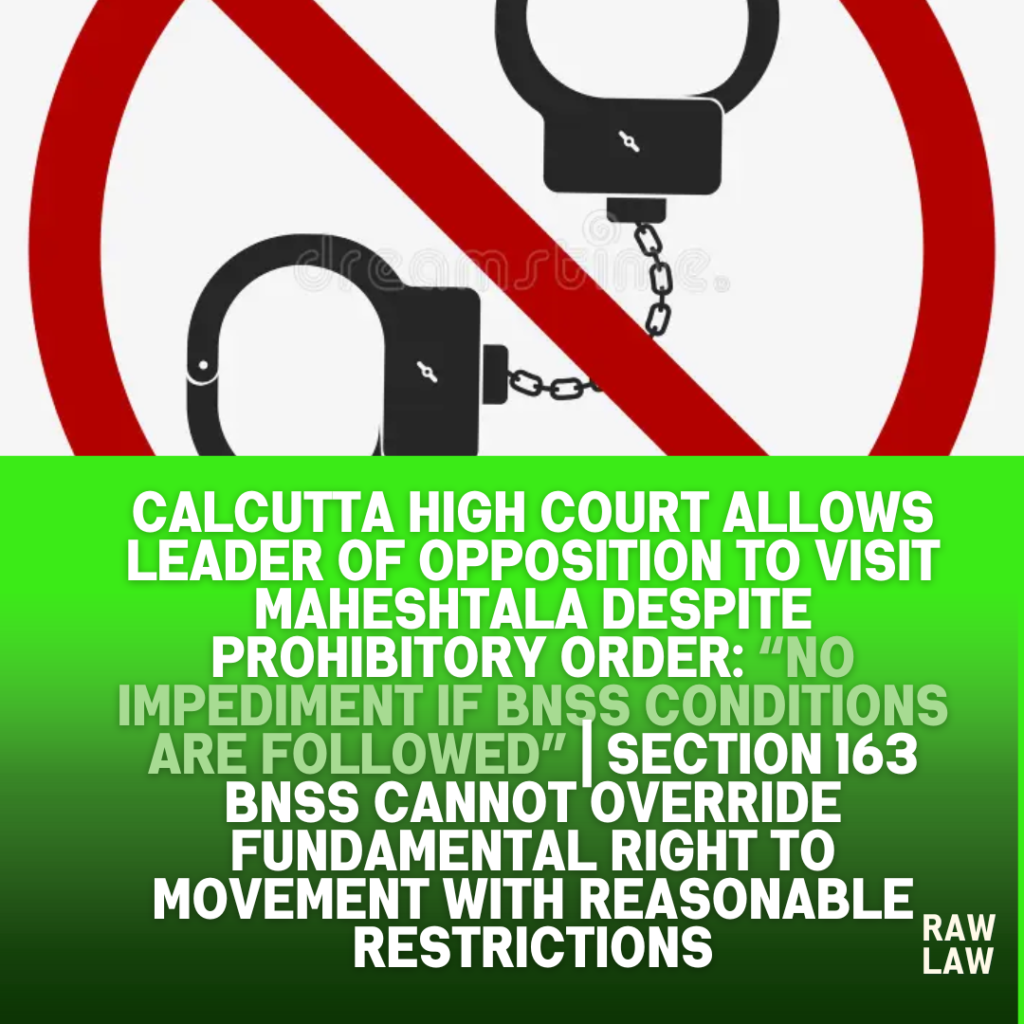Court’s Decision
In W.P.A. 12966 of 2025, the Calcutta High Court allowed the petitioners—comprising the Leader of Opposition and another Member of the Legislative Assembly—to visit Maheshtala, West Bengal, notwithstanding a prohibitory order issued under Section 163 of the Bharatiya Nagarik Suraksha Sanhita (BNSS), 2023. The Court, presided by Justice Saugata Bhattacharyya, held that since the order dated 13 June 2025 did not completely prohibit movement but only imposed conditional restrictions, “there is no impediment in permitting the petitioners to visit the locale in compliance with the conditions”.
Facts
The petitioners sought protection and permission to visit Maheshtala under Rabindranagar Police Station, following an incident on 11 June 2025. A written request had been made to the Superintendent of Police, Diamond Harbour, on the same day. However, their request was denied on 12 June 2025 on the ground that a Section 163 BNSS order had been passed by the Sub-Divisional Magistrate on 13 June 2025, prohibiting movement in the area.
Issues
- ‘Whether the order passed under Section 163 BNSS completely barred the petitioners from entering the area.
- Whether the Court could allow access to a restricted area for public representatives despite prohibitory orders.
- Whether police protection can be directed by the Court under Article 226 in light of such prohibitions.
Petitioners’ Arguments
The petitioners, represented by senior counsel, argued that:
- In similar previous situations, including WPA 8694 of 2025, coordinate and Division Benches of the High Court had granted permission to the petitioners to visit restricted areas with safeguards.
- The petitioners were willing to visit the area in groups of fewer than five persons and fully abide by the conditions mentioned in the 13 June 2025 prohibitory order under Section 163 BNSS.
- The petitioners only intended to interact with local residents and not organize any public rally or cause a disturbance.
Respondents’ Arguments
The State, represented by the Advocate General, and counsel for private respondents contended that:
- The Section 163 BNSS order was validly passed by the competent authority and remedial steps were available under BNSS to challenge or vary the order.
- There was no need for a writ of mandamus since the petitioners could proceed to the area in compliance with the order if it did not explicitly bar them.
- The Court should not issue a blanket police protection order, as there was no legal bar against the petitioners following the BNSS framework.
Analysis of the Law
Section 163 of BNSS authorizes the Sub-Divisional Magistrate to impose prohibitory orders to prevent breach of peace or disturbance. However, such orders must be reasonable and proportionate, and cannot operate to completely nullify the constitutional right to movement and interaction with constituents by elected representatives.
The Court adopted a harmonious construction approach—permitting the petitioners’ movement within the framework of the Section 163 BNSS order.
Precedent Analysis
The Court referred to the Division Bench order dated 23 April 2025 in WPA 8694 of 2025, where the petitioners were similarly permitted to visit a locale subject to compliance with certain restrictions. That order was treated as persuasive precedent, with the present Court “drawing inspiration” from it to allow the instant request.
Court’s Reasoning
The Court carefully examined the prohibitory order dated 13 June 2025 and found that:
- The order did not absolutely prohibit entry, but imposed specific conditions.
- As long as the petitioners complied with those conditions—such as limiting the number of visitors, prior police intimation, and non-engagement in speech or processions—there was no legal bar to their visit.
- The request for protection was partially accepted with a direction to local police to ensure that “no untoward incident takes place” and adequate police presence is maintained.
Conclusion
The writ petition was disposed of with the following directions:
- Petitioners were permitted to visit Maheshtala within 3 days from the order date.
- Prior 24-hour intimation must be given to the Superintendent of Police and Officer-in-Charge of Rabindranagar P.S.
- Petitioners must follow all conditions in the 13 June 2025 Section 163 BNSS order.
- Petitioners shall not deliver public speeches or organize processions during the visit.
- Police authorities are directed to deploy sufficient personnel to maintain peace during the visit.
No cost was awarded, and legal issues raised in the petition were left open.
Implications
This ruling strikes a balance between administrative authority and constitutional freedoms, especially for public functionaries like MLAs. It reiterates that Section 163 BNSS orders must be read in context, and cannot be used to silently stifle democratic engagement. Courts retain the discretion to permit limited movement even under prohibitory frameworks, provided the right to expression and association is not abused.
This judgment may serve as a blueprint for handling similar political movement cases under the new BNSS regime.
Cases Referred
WPA 8694 of 2025 (Calcutta High Court): A prior Division Bench order dated 23 April 2025 allowed the petitioners to visit a restricted location subject to conditions. The present Court relied on this as precedent to arrive at a similar conclusion.
